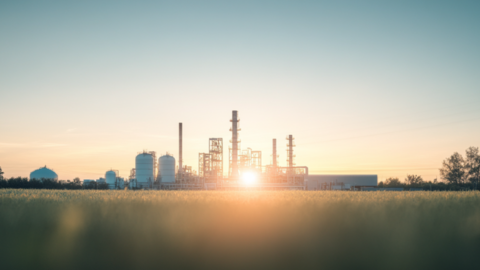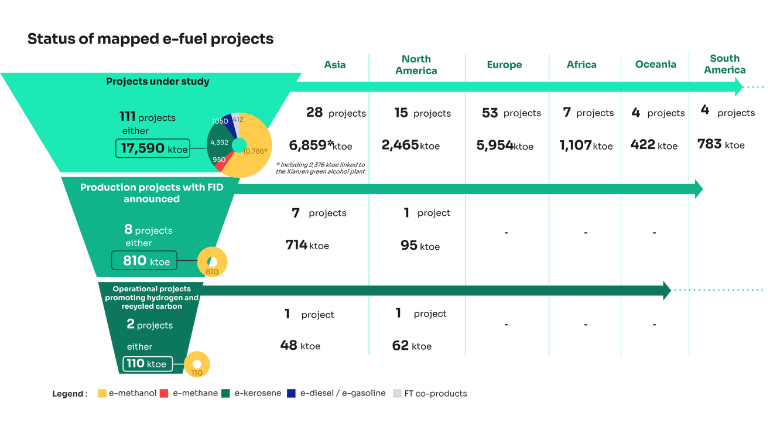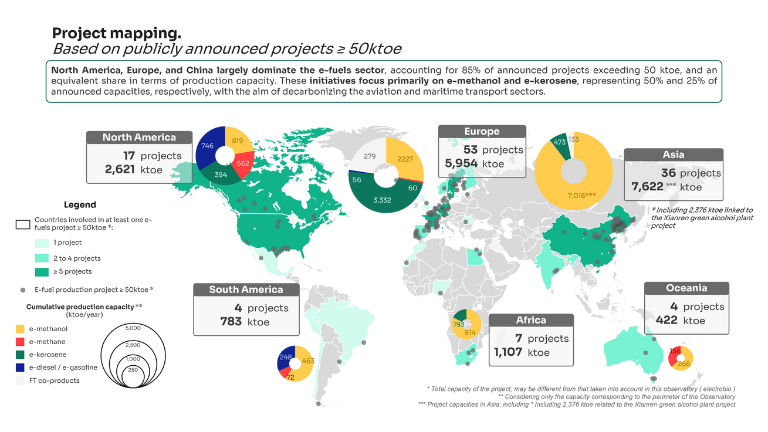Companies news
Sia published the International E-Fuels Observatory, 2025 Edition

Produced by Sia, the 2025 edition of the International E-Fuels Observatory shows that regional e-fuel sectors are on the verge of industrialisation.
The second edition of the International e-fuels Observatoryconfirms the rapid expansion of the e-fuels sector, with nearly 120 industrial-scale projects identified in 28 countries, driven by rising decarbonisation targets in the maritime and aviation sectors.
Produced by Sia on behalf of the French e-fuels office, this publication provides an in-depth overview of the development of e-fuels worldwide.
The 2025 International e-fuels observatory offers a detailed mapping of current projects and public policies and identifies the main technological and economic challenges still to be overcome.
The study highlights two regions leading the rise of e-fuels as a tool for decarbonising heavy mobility and industry: China, which accounts for 60% of planned e-methanol production capacity, and Europe, which accounts for 65% of planned e-kerosene production capacity.

The pace of development is accelerating, dominated to date by two major centers: China and Europe
The cumulative annual production capacity of large-scale projects, defined by a production volume of at least 50,000 tons of oil equivalent (toe), amounts to 18,500 ktoe. This is equivalent to the primary energy consumption of 6 million Europeans (UE-27).
E-methanol accounts for 65% of the announced capacity, with the aim of decarbonising the maritime sector and replacing the fossil methanol used in the chemical industry. The e-kerosene sector accounts for 25% of planned e-fuel production capacity.
These initiatives, spread across all continents, vary considerably in size and level of maturity, reflecting the growing interest in these synthetic fuels as part of the energy transition by a wide range of players of different sizes.

European potential to be confirmed
European regulations encourage the decarbonisation of transport and heavy mobility, with particularly strong constraints in the aviation sector via mandates for the mandatory incorporation of alternative fuels (ReFuelEU Aviation regulations). The European e-kerosene industry accounts for 75% of the world's planned capacity.
The volume of e-kerosene production planned on the continent represents 3.3 million toe (around 4 billion liters). Application of the ReFuelEU Aviation regulation could lead to demand of the same order of magnitude by 2035.
Turning Plans Into Action
To stay in the race, however, Europe needs to ensure that final investment decisions are taken in 2025-2026, whereas 8 e-methanol production projects in China have already passed this stage.
Despite technical leadership, European projects will only be able to materialise with the confirmation of public support to secure the business models of the first projects. A pragmatic approach to eligible sources of low-carbon electricity and CO2 will also be needed.
Source: Sia


